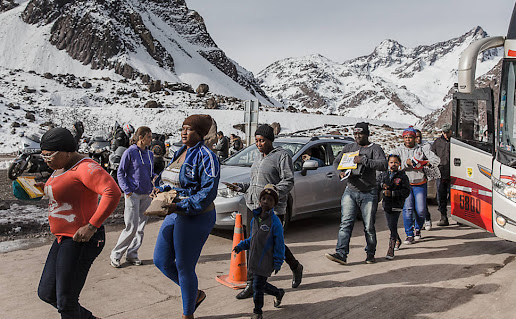DREAMS :
''' '' CHILEAN HAITIAN
CHAPTER '' '''
''CHILEAN DREAM'' TURNS SOUR : Haitian refugees who say they're now feeling unwelcome in South America gamble on U.S.
IVENET DORSAINVIL - 34, PROFESSOR and spokesman for the Haitian groups in Chile, moved to Santiago in 2010 after getting a student visa and a slot in a graduate program.
When he moved, Chile was springing back from the global financial crisis, and there were plenty of jobs for the migrants.
But over the years, that changed. Migrants were accused of taking jobs away from Chileans and straining social services.
The country found itself absorbing hundreds of thousands of Venezuelans fleeing dire conditions in their own country.
PHALONE HAD MANAGED TO MAKE ends meet since moving from Haiti to Chile in 2013 -working as a hairdresser in a small town north of the capital.
But in May, she, her two children, and 20 relatives embarked upon a perilous, 4,700 mile long journey north to the United States, taking a gamble and hoping for the best.
''Things have become difficult for immigrants in Chile,'' said Phalone, who did not want her last name published, for fear it would endanger her immigration prospects in the United States. ''They tell us go back home, that we are scum.''
Of the thousand of Haitians who showed up recently at the southern border of the United States, many came from Chile. As Haitians sought refuge from the devastating 2010 earthquake on their island, Chile - with its generous entry policy and stable economy - was an attractive destination.
Things changed quickly with the election of two new presidents.
In Chile, migrants found themselves facing new restrictions after the election of President Sebastian Pinera; in the United States, the Biden administration offered new protections for Haitian migrants who were already there.
Haitians in Chile, mistaking Mr. Biden's offer for a welcome mat, set out on the arduous trek north of the border, only to find themselves forcibly returned to Haiti, sometimes in shackles.
''We were sold the 'Chilean dream','' but it turned out to be false,'' said Steeve Azor, 28, who migrated from Haiti to Chile in 2014. ''Everyone thought President Biden would be more flexible on migration.''
To those who made it to the border community of Del Rio, Texas, after months on the road, it was instantly clear that they had been mistaken. There was scant welcome for them by the United States, just scenes of squalor and desperation.
Some were forcibly repulsed by the U.S. Border Patrol agents on horseback as they tried to cross the Rio Grande. Thousands of others crammed under a bridge, and many were flown back to where it all began : Haiti, a broken country where crisis is piled upon crisis.
And yet many Haitians are still making their way from Chile, either unaware of what awaits them at the U.S. border or willing to take their chances. In part, that is because life in Chile is increasingly difficult for migrants.
As of December, there were more than 182,000 Haitians living in Chile, according to the government figures. That does not include undocumented migrants, who are invisible to the government and therefore vulnerable to ''abuses when it came to work and housing,'' said Alvaro Bellolio, the director of Chile's National Migration Service.
Work and housing, always hard to get, grew still more scarce during the pandemic. Many Haitians became destitute. Some rent rooms in overcrowded, run down homes. Others became squatters, Many work as street vendors.
''I researched Chile and its economy before coming,'' said Mr. Azor, the Haitian migrant, ''but I never imagined we would be living in an overpriced room and sharing a bathroom with 20 others.''
And as the ranks of Haitian migrants grew, spiking in 2017 and 2018, many in the largely white nation began to treat them with special disdain, Mr. Dorsainvil said.
Some Haitians, he said, were clear eyed about the risks of trying to make it into the United States. '' People are selling the few things they have and leaving with their children,'' Mr. Dorsainvil said.
''They say they'd rather die than keep being humiliated here.''
Waleska Ureta, the director of the Jesuit Service for Migrants, said Chile could have done more to set up Haitians for success.
''This was a failed experience of inclusion,'' Ms. Ureta said. ''In Chile, Haitians are facing cultural and social discrimination, even at a government level, and racism in workplaces and on the streets.
The Sadness of this publishing, continues. The World Students Society thanks author, Pascale Bonnefoy.
With respectful dedication to the Leaders, Students, Professors and Teachers of Chile and Haiti, and then the world. See Ya all prepare and register for Great Global Elections on The World Students Society : wssciw.blogspot.com and Twitter - !E-WOW! - The Ecosystem 2011 :
Good Night and God Bless

.png)


0 comments:
Post a Comment
Grace A Comment!